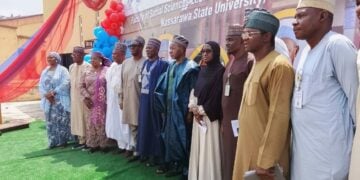How has the journey been as the rector?
We have been on the saddle of the affairs of this Polytechnic for over a year now. The journey is quite interesting and has been illuminating, challenging, and full of rich experiences. It has given me the opportunity to contribute to the development of the institution and to place it on the global map. Our goal is to make Plateau State Polytechnic compete favourably with others across the world and to produce graduates who can fit into the emerging economy. These should be graduates with digital skills, who are not only employable but can become employers of labour themselves in alignment with global trends.
Since you came on board, what are some of the challenges and how are you addressing them?
The challenges we have are not unique to Plateau State Polytechnic; they are national issues. One major issue is the dichotomy and discrimination against Polytechnic graduates. They are often made to feel inferior, judged not by their competence but by the environment where they earned their certificates. This perception has greatly affected enrollment in Polytechnics and Colleges of Education.
Another challenge is inadequate funding, which is a nationwide problem. Polytechnics, being technical institutions, require significant investment in facilities and equipment for workshops and laboratories so that students can gain practical experiences that reflect their training.
Specifically for Plateau State Polytechnic, we’ve had to address the decay in our infrastructure and regain the confidence of people who had lost faith in the institution. In the past, there were constant strikes and closures, and students were not motivated to study here nor did they feel safe because of insecurity. Some would rather travel to far away Bauchi, Kaduna or Nasarawa State for their Polytechnic education even when we have a reputable institution right here with a long-standing history of excellence.
Also, we faced the challenge of changing people’s perception of the system. Many believe that Polytechnics are inferior to universities. That’s a major misconception. Personally, I was trained in the university, not in Polytechnic, but I can tell you that the system here is highly effective and should be respected.
In terms of student enrollment, we have made significant progress. Our improved facilities have attracted more candidates. This year alone, we matriculated about 5,225 students, which has significantly boosted our population. Today, our infrastructure has improved not only at the Jos campus but also at the main campus. We’ve upgraded staff accommodations, classrooms, medical facilities, laboratories and workshops. We have also built a new administrative block here in Jos campus.
There’s a world-class hall that can host any event. Our twin lecture theatres have been renovated to modern standards. We are constructing a massive 42-room administrative complex. Our renovated clinic has even been enlisted under PLASCHEMA and now serves not just our students but the surrounding community.
In terms of security, we have equipped our personnel with motorcycles for effective patrol and surveillance. We’ve also beautified the environment because a good learning atmosphere enhances academic success.
Thanks to the state governor, Barr Caleb Mutfwang for his support. The issue of constant strikes is now something of the past. Staff are paid as and when due, creating a conducive work environment. This support has helped the system to bounce back, and I can confidently say we’re on a good trajectory.
Apart from development of the infrastructure that you mentioned, how were you able to tackle the shortage of manpower and staff training?
We’ve implemented a deliberate policy of staff training and retraining. Staff attend conferences and workshops in their fields with institutional support. Those pursuing further studies are allowed to go and gain experience that they can bring back and apply here.
For instance, last year, we sent someone to China for four months of specialised training. He returned with valuable knowledge that has been instrumental in improving our institution. We’ve created more opportunities for training, conferences and workshops. Staff with first degrees are encouraged to pursue second degrees, and those with second degrees are supported to go for PhDs. In fact, today, Plateau State Polytechnic has more PhD holders than some universities. This has given us the human capital needed to start contemplating the introduction of a Bachelor of Technology programme. We are even capable of offering postgraduate programmes up to PhD level, if given the mandate. Unfortunately, Polytechnics in Nigeria do not currently have the mandate to offer postgraduate degrees, but we are exploring options for affiliations. We are already running Postgraduate Diplomas in collaboration with Nasarawa State University and are also working toward introducing MBAs and MPAs through similar affiliations. We have both the facilities and the manpower to deliver.
We have challenges in the area of staff recruitment especially with irregularities in the previous recruitment exercises conducted. You don’t just recruit anyone in a tertiary institution; you must recruit qualified individuals in areas where their services are needed.
When this current administration came on board, we were given the go-ahead to conduct recruitment properly. We advertised the positions, conducted interviews, and recruited based on departmental needs. In the next one to two weeks, we are expecting the release of the list of new recruits, which will help address our manpower shortages.
What is the current total population of students in the Polytechnic?
As of today, we have nearly 9,600 students. When we came in, the population was less than 4,500. Within one year, we’ve more than doubled that figure. We’re working hard to sustain this growth and fulfill our vision.
What edge does Plateau State Polytechnic have over other state Polytechnics?
We’ve introduced innovative approaches, especially in digital skills and entrepreneurship. We’ve shifted focus from purely theoretical to practical training. Students must graduate not just with diplomas or HNDs, but with at least one skill.
For example, a student studying Mass Communication can also learn tailoring. A Civil Engineering student can learn barbing. A Mechanical Engineering student might also pick up tiling. Also, a student of Statistics can also be trained in satellite installation. A Business Administration graduate could combine their academic credentials with a practical skill. These combinations give our students an edge over others. The response has been very encouraging.
What is the accreditation status of courses of the Polytechnic?
About 34 courses from 27 departments in Heipang main campus have all been accredited. Some of the courses are Engineering, Science and Environmental Science, among others.
we are also waiting to finish the re-accreditation of about nine courses in the Jos campus of the Polytechnic in the next two months.
What is the level of TETFund intervention in Plateau State Polytechnic?
TETFund is doing a wonderful job, but we’re not entirely satisfied because Polytechnics still receive less funding than universities and even colleges of education. This is despite the fact that we sometimes have more students than some of those institutions. We are advocating for a review of the funding formula to make it more equitable. But again, TETFund has done tremendously well.
What is your advice to prospective students from Plateau State?
They should return home to learn not just for certificates but for skills. Education should empower you to become an employer of labour, not just a job seeker.
To the Plateau State Government, we say thank you for all the support. We urge the state government to continue the good work. This administration has done a lot to support us to enable us to deliver on our mandate. Governor Mutfwang envisions Plateau State Polytechnic to become one of the most competitive institutions globally, and with continued support, we can achieve that.





